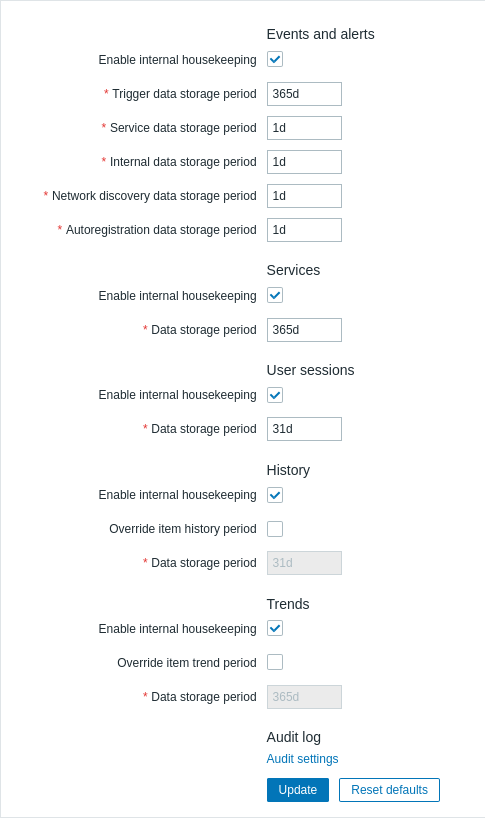3 ハウスキーピング
Overview
The housekeeper is a periodical process, executed by Zabbix server. The process removes outdated information and information deleted by user.

In this section housekeeping tasks can be enabled or disabled on a per-task basis separately for: events and alerts/IT services/user sessions/history/trends. Audit housekeeping settings are available in a separate menu section.
If housekeeping is enabled, it is possible to set for how many days data records will be kept before being removed by the housekeeper.
Deleting an item/trigger will also delete problems generated by that item/trigger.
Also, an event will only be deleted by the housekeeper if it is not associated with a problem in any way. This means that if an event is either a problem or recovery event, it will not be deleted until the related problem record is removed. The housekeeper will delete problems first and events after, to avoid potential problems with stale events or problem records.
For history and trends an additional option is available: Override item history period and Override item trend period. This option allows setting globally for how many days item history/trends will be stored (1 hour to 25 years; or "0"), overriding the respective Store up to values set for individual items in the item configuration form. Note that the storage period will not be overridden for items that have configuration option Do not store enabled.
It is possible to override the history/trend storage period even if internal housekeeping is disabled. Thus, when using an external housekeeper, the history storage period could be set using the history Data storage period field.
If using TimescaleDB, in order to take full advantage of TimescaleDB automatic partitioning of history and trends tables, Override item history period and Override item trend period options must be enabled as well as Enable internal housekeeping option for history and trends. Otherwise, data kept in these tables will still be stored in partitions, however, the housekeeper will not drop outdated partitions, and warnings about incorrect configuration will be displayed. When dropping of outdated partitions is enabled, Zabbix server and frontend will no longer keep track of deleted items, and history for deleted items will be cleared when an outdated partition is deleted.
Time suffixes are supported in the period fields, e.g., 1d (one day), 1w (one week). The minimum is 1 day (1 hour for history), the maximum - 25 years.
The Reset defaults button allows reverting any changes made.
Configuration
The table below describes housekeeping configuration parameters.
| Parameter | Description |
|---|---|
| Enable internal housekeeping | Enable (default) or disable internal housekeeping for this group of entities. |
| Data storage period | Amount of time records should be kept before being removed by the housekeeper. Mandatory if housekeeping is enabled. Range: 1 day (1 hour for history) - 25 years; or "0". Time suffixes are supported, e.g., 1d (one day), 1w (one week). For Events and alerts data storage period is set separately for triggers, services, internal data, network discovery, and autoregistration. For items, data storage period also determines the period for which the data will be visible in the Monitoring > Latest data section, even if internal housekeeping is disabled. |
| Override item history period | If checked, history/trend storage period specified in the item configuration will be overridden by the global setting. The storage period will not be overridden for items that have configuration option Do not store enabled. It is possible to override the history/trend storage period even if internal housekeeping is disabled. Thus, when using an external housekeeper, the history storage period could be set using the history Data storage period field. |
| Override item trend period |
The Reset defaults button allows reverting any changes made.
- Deleting an item/trigger will also delete problems generated by that item/trigger.
- Problem or recovery events will not be deleted until their related problem record is deleted. The housekeeper first deletes problems, then events, to prevent stale data.

